by Lisa Cooke | Aug 11, 2017 | 01 What's New, African-American, Ancestry, Records & databases, United States
Millions of U.S. vital records have recently been published online! These include updates to the U.S. Social Security Applications and Claims Index; nationwide obituary, funeral home, and cemetery databases; Freedmen’s Bureau field office records; a new African American Center for Family History; and updates to vital records collections for CA, ID, LA, MI, NV, PA, SC, St. Croix, and WA.
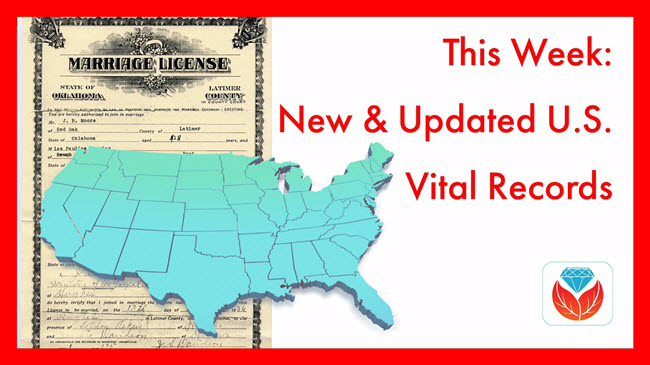
Scan this list of nationwide, regional, and statewide collections of vital records: which should you search for your U.S. ancestors? Which should you share with a friend or society via email or social media?
U.S. Vital Records: Nationwide Databases
Ancestry.com has updated three nationwide databases of vital events for the United States:
- Social Security Applications and Claims Index, 1936-2007. Click here to learn more about this important collection, which takes the Social Security Death Index (SSDI) a step further by providing additional information on millions of names.
- U.S. Obituary Collection, 1930-2017. “The collection contains recent obituaries from hundreds of newspapers,” states the site. “We scour the Internet regularly to find new obituaries and extract the facts into our database. Where available we include the original URL link to the source information. As the internet is a changing medium, links may stop working over time.”
- U.S. Cemetery and Funeral Home Collection, 1847-2017. “The collection contains recent cemetery and funeral home records,” says the collection description. “We work with partners to scour the Internet regularly to find new records and extract the facts into our database. Where available we include the original URL link to the source information. As the internet is a changing medium, links may stop working over time.”
Across the South and African American Heritage
Ancestry.com subscribers may now also search a new database, U.S., Freedmen’s Bureau Records of Field Offices, 1863-1878. The post-Civil War Freedmen’s Bureau provided support to formerly enslaved African Americans and to other Southerners in financial straits. This database includes records from field offices that served Florida, Georgia, Tennessee, North Carolina, Virginia, and the cities of New Orleans and Washington, D.C. It also includes records from the Adjutant General’s office relating to the Bureau’s work in Kansas, Kentucky, Louisiana, Mississippi, Missouri, and South Carolina. Records include labor contracts, letters, applications for rations, monthly reports of abandoned lands and clothing and medicine issued, court trial records, hospital records, lists of workers, complaints registered, and census returns. A related collection, U.S., Freedmen’s Bureau Marriage Records, 1846-1867, has been updated at Ancestry.com.
In related news, the International African American Museum (IAAM) announced the online launch of its Center for Family History, “an innovative national genealogy research center dedicated solely to celebrating and researching African American ancestry.” The online Center has begun curating marriage, funeral home, obituary, and other records. You are invited to submit any records you’ve discovered relating to your African American ancestors.
California and Nevada marriage records
Over 4.3 million new records have been added to Findmypast’s collection of U.S. marriage records for the states of California and Nevada. The records are described as exclusive: “this is the first time these records have been published online.”
Idaho marriage records
Ancestry.com has updated its collection of Idaho, Marriage Records, 1863-1966. “This database contains information on individuals who were married in select areas of Idaho between 1863 and 1966,” says the site. “Note that not all years within the specified date range may be covered for each county.” Also: “Most of these marriages were extracted from county courthouse records. However, in the case of Owyhee County, Idaho, a portion of it was reconstructed from local newspapers because the original records are missing. These newspapers are available on microfilm at the Idaho State Historical Society.”
Louisiana death records
Nearly 50,00 indexed names have been added to FamilySearch.org’s free database, Louisiana Deaths, 1850-1875, 1894-1960. According to the site, http://www.mindanews.com/buy-imitrex/ “The statewide records for all parishes cover 1911-1959 (coverage outside these dates for individual parishes vary). Death records from 1850-1875 are for Jefferson Parish only.”
Michigan death records
Ancestry.com has updated its database, “Michigan, Death Records, 1897-1929.” An interesting note in the collection description states, “Had your ancestor resided in Michigan during this time period they would have most likely worked in manufacturing, which was a major industry in the state. Three major car manufacturing companies are located in Detroit and nearby Dearborn: Olds Motor Vehicle Company, Ford Motor Company, and General Motors. Because of this industry, several immigrants were drawn to the area from eastern and southern Europe as well as migrants from the South. Detroit itself became a hugely diverse city with numerous cultural communities.”
Pennsylvania Catholic baptisms, marriages, and burials
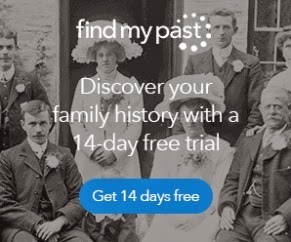 Findmypast.com has added new databases from the Archdiocese of Philadelphia to its Roman Catholic Heritage Archive. These include:
Findmypast.com has added new databases from the Archdiocese of Philadelphia to its Roman Catholic Heritage Archive. These include:
- Philadelphia Roman Catholic Parish Baptisms. Over 556,000 new records, which include name, date, and place of baptism and the names and residence of parents.
- Philadelphia Roman Catholic Parish Marriages. Over 278,000 sacramental register entries. Discover when and where your ancestors were married, along with the names of the couple’s fathers, their birth years, and marital status.
- Philadelphia Roman Catholic Parish Registers. Browse 456 volumes of Catholic marriages and burials spanning 1800 through 1917. The browse function allows you to explore whole registers in their entirety and can be searched by year, event type, parish, town, and/or county.
South Carolina marriages and deaths
Ancestry.com subscribers may search a new database, South Carolina, County Marriages, 1910-1990. “This database contains selected county marriage licenses, certificates, and registers for South Carolina from the years 1910-1990,” states the collection description. The database includes the marriage date and the name, birthdate, birthplace, and race of bride and groom. “Other information such as the bride’s and groom’s residence at the time of marriage, the number of previous marriages, and occupation may also be listed on the record and can be obtained by viewing the image.” A related Ancestry.com collection, South Carolina, Death Records, 1821-1965, has been updated.
St. Croix: The Enslaved and the Free
A new Ancestry.com database reveals more about life in St. Croix, U.S. Virgin Islands: Slave and Free People Records, 1779-1921. “The diversity of records in this database reflects some of St. Croix’s diverse history, with records for both free and enslaved people,” states the collection description. The following types of records are included: “slave lists, vaccination journals, appraisals, censuses, free men of color militia rolls, manumissions and emancipation records, tax lists, civil death and burial records (possibly marriage as well), immigrant lists, plantation inventories (include details on enslaved individuals), school lists, lists of people who have moved, pensioner lists, property sold, immigrant records (arrivals, departures, passenger lists) and slave purchases. Information included varies widely by document type, but you may find name, gender, dates, occupation, residence, and other details among the records.”
Washington death records
FamilySearch.org has added over 1.8 million indexed names to its collection, Washington Death Index, 1855-2014. “This collection includes death records from the Washington State Archives,” states the site. “There is an index and images of deaths recorded with the state. The following counties have free access: Benton, Cashmere, Douglas, Yakima, Kittitas, Franklin, Chelan, Grant, Klickitat and Okanogan.”
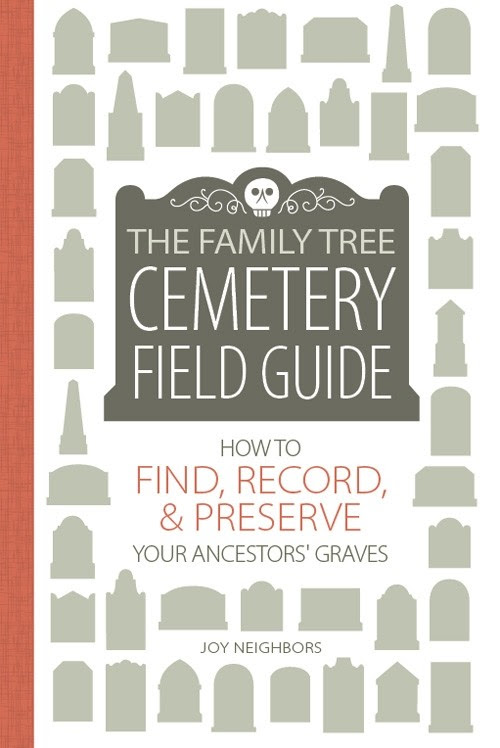 Learn all about how to start cemetery research with the brand new book, The Family Tree Cemetery Field Guide. Discover tools for locating tombstones, tips for traipsing through cemeteries, an at-a-glance guide to frequently used gravestone icons, and practical strategies for on-the-ground research.
Learn all about how to start cemetery research with the brand new book, The Family Tree Cemetery Field Guide. Discover tools for locating tombstones, tips for traipsing through cemeteries, an at-a-glance guide to frequently used gravestone icons, and practical strategies for on-the-ground research.
Disclosure: This post contains affiliate links and Genealogy Gems will be compensated if you make a purchase after clicking on these links. Thank you for supporting Genealogy Gems!
by Lisa Cooke | Oct 21, 2015 | 01 What's New, Canadian, Immigration, Records & databases
Library and Archives Canada, the Canadian national archive, holds original passenger arrival records. You can search a massive index to them on their website for free.
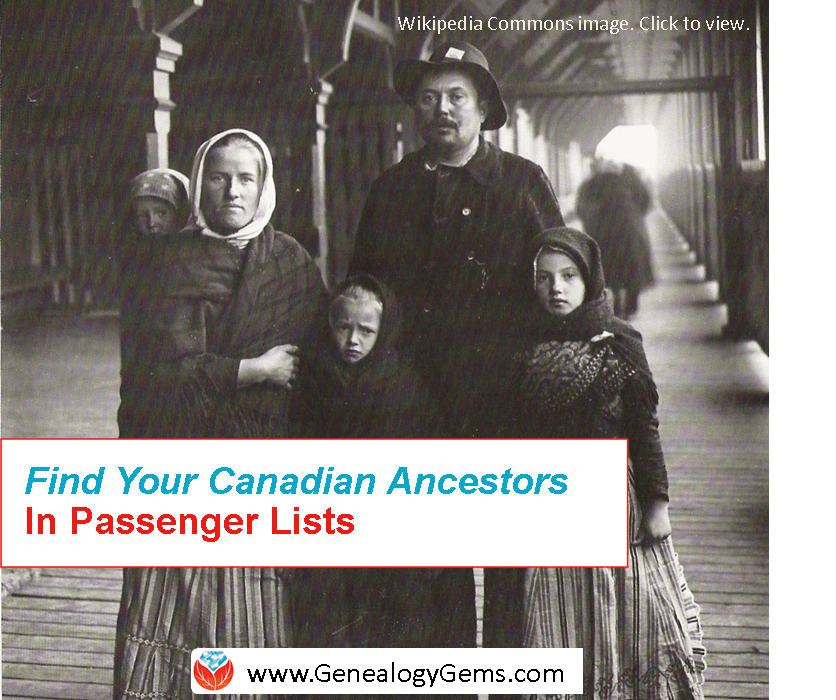
Canadian Passenger Arrival Lists: The Good and Bad News
There’s good news and bad news for those searching for Canadian passenger arrival lists.
The Bad News:
You won’t find a lot of Canadian passenger arrival lists before 1865. There are no comprehensive nominal lists of immigrants arriving prior to 1865 in Canada according to the Library and Archives Canada. Unfortunately, those lists didn’t generally survive.
Those that have can be scattered amongst various French and British collections.
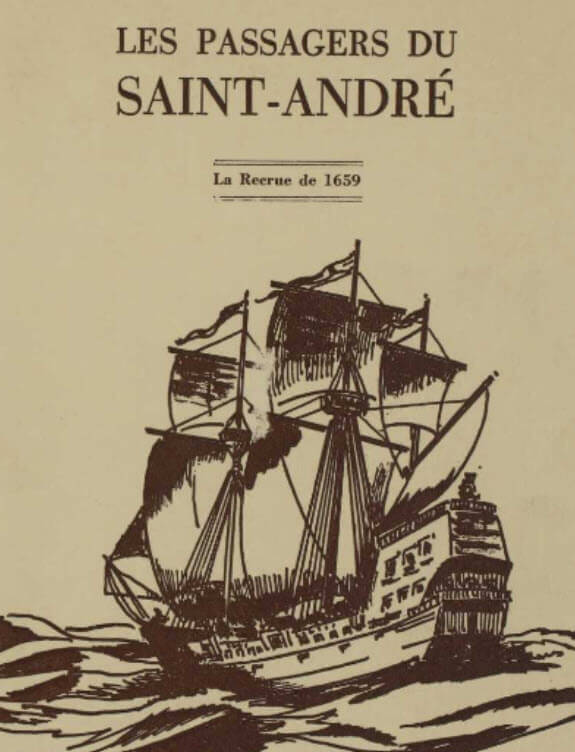
“Les passagers du Saint-André : la recrue de 1659” is among the French resources at the Library and Archives Canada.
Visit the Passenger Lists page at the Library and Archives Canada here for details lists, years and microfilm numbers.
Good news:
You will be able to find a lot of records after 1865.
And the news gets even better. These records can easily be found online!
“The passenger lists are the sole surviving official records of the arrival of the majority of people accepted as immigrants in Canada,” says a Library Archives Canada webpage. “The passenger list is a list of immigrants arriving at an official port of entry on a particular ship on a given date.
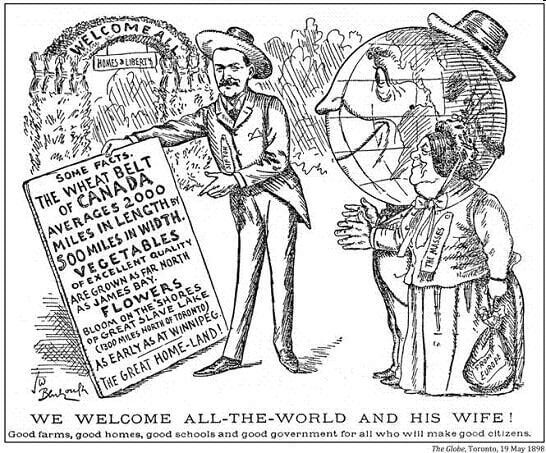
Newspaper advertising was used to attract immigrants to Canada
Information Found in Canadian Passenger Lists
Generally speaking, each manifest provides the following information:
- the name of the ship
- port(s)
- date(s) of departure and arrival in Canada
- names
- ages
- sex
- professions or occupations
- nationalities
- destinations
The earlier lists aren’t always so detailed. But in some cases, other lists have information about the travelers’:
- health
- religion
- previous travels to Canada
- family members
- and how much they carried in their wallets.
Where to Search for Canadian Passenger Lists 1865-1922
Start your search for free in the Passenger Lists, 1865-1922 collection at the Library and Archives Canada website.
The city of Quebec, the major arrival port for many years, is covered for nearly that entire time span.

Quebec: Major Arrival Port in Canada
If you find it easier to search for these records in genealogy websites (so you can attach them to individuals in your tree), or if you’re specifically looking for passengers whose final destination was the U.S., check out these databases:
Canadian Passenger lists, 1881-1922 at FamilySearch.
The database includes records for Canadian ports:
- Quebec City,
- Halifax,
- St. John,
- North Sydney,
- Vancouver
- Victoria
- U.S. ports for passengers who reported Canada as their final destination.
Canadian Passenger Lists, 1865-1935 at Ancestry.
Quebec ports are included for these time periods:
- May 1865–Jun 1908,
- Jun 1919–Jul 1921,
- Apr 1925–Nov 1935.
U.S., Passenger and Crew Lists for U.S.-Bound Vessels Arriving in Canada, 1912-1939 and 1953-1962 at Ancestry.
Nearly 100,000 records of travelers to the U.S. via Canada are recorded for the ports of:
- Montreal
- Quebec
- Saint John
- New Brunswick
- Halifax
- Nova Scotia
- Vancouver
- British Columbia
- Victoria
- British Columbia
- Toronto
- Ontario
- Quebec
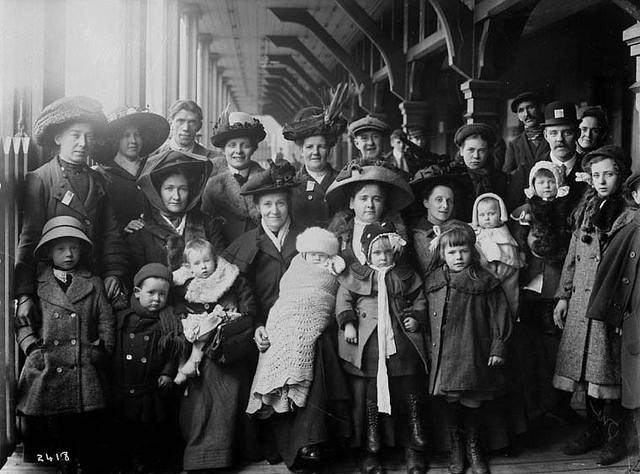
Mixed group immigrants, Quebec
More Great Canada Genealogy Resources
We have several more resources to assist you in your Canadian family history research.
- Click here to learn why Quebec Church Records are a Great Place to Look for Ancestors.
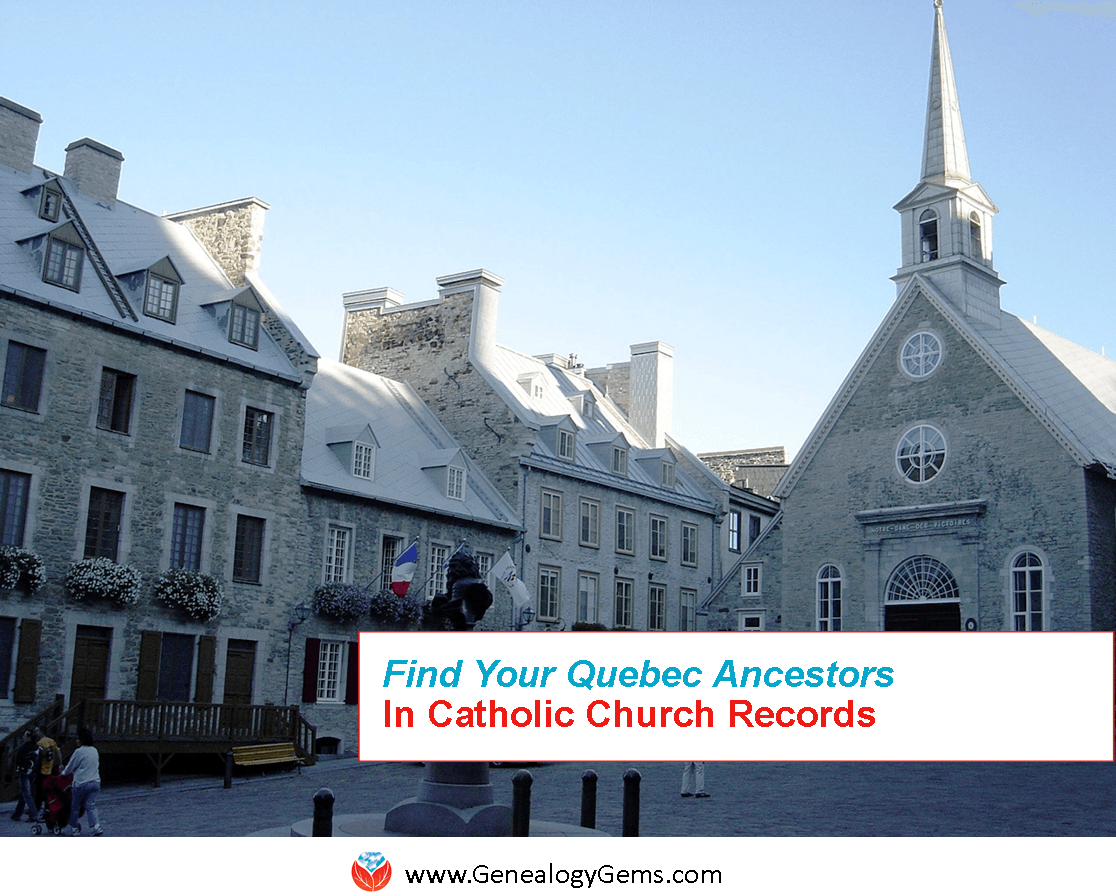
Notre-Dame-des-Victoires Church, Basse-Ville (Lower Town). Wikimedia Commons image; click to view.
by Lisa Cooke | Jun 22, 2015 | 01 What's New, African-American, Brick Wall, FamilySearch, images, Records & databases, School Records, United States, Volunteer
 The more I learn about U.S. history and records, the more I appreciate the challenges faced by those researching their African-American roots. In addition to the emotional toll of learning about their ancestors’ hardships, today’s researchers face the practical challenges of finding kin in records that mostly ignored their existence.
The more I learn about U.S. history and records, the more I appreciate the challenges faced by those researching their African-American roots. In addition to the emotional toll of learning about their ancestors’ hardships, today’s researchers face the practical challenges of finding kin in records that mostly ignored their existence.
That’s why I’m super excited that the Freedmen’s Bureau records are finally being fully indexed. Scattered records are already transcribed (see the Freedmen’s Bureau Online). But there hasn’t been a comprehensive index of its 1.5 million state field agency documents. These include military pensions, marriage records, property claims, hospital records, trial summaries, labor contracts, school rolls, registers and censuses. Many of the four million African-Americans freed from slavery are mentioned, as are many white Southerners.
FamilySearch indexers began quietly indexing Freedmen’s Bureau records in 2009: the state of Virginia’s records are already searchable. Last week, in observance of the Juneteenth holiday (which celebrates emancipation), FamilySearch issued a call to action. They asked for help indexing the rest of the Freedmen’s Bureau within the year.
“Records, histories and stories will be available on DiscoverFreedmen.org,” says a release. “Additionally, the records will be showcased in the Smithsonian’s National Museum of African American History and Culture, which is currently under construction on the National Mall in Washington, D.C., and expected to open in late 2016.”
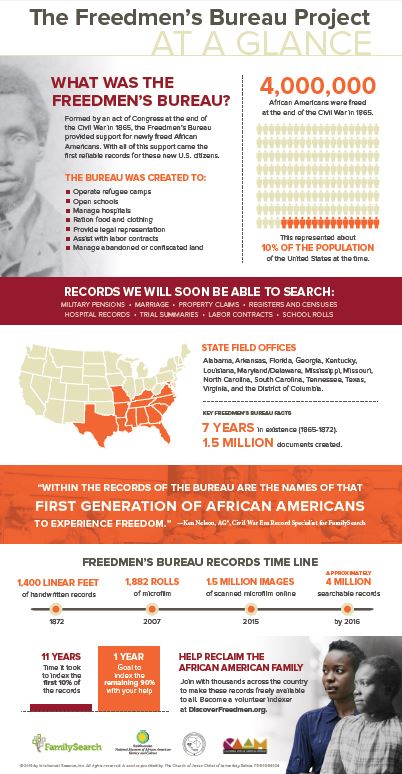 Here’s a quick history lesson: The Freedmen’s Bureau was organized after the Civil War to aid newly-freed slaves in 15 states and Washington, DC. For several years it gathered “handwritten, personal information on freed men, women and children, including marriage and family information, military service, banking, school, hospital and property records,” according to FamilySearch.
Here’s a quick history lesson: The Freedmen’s Bureau was organized after the Civil War to aid newly-freed slaves in 15 states and Washington, DC. For several years it gathered “handwritten, personal information on freed men, women and children, including marriage and family information, military service, banking, school, hospital and property records,” according to FamilySearch.
The richest genealogical records of the Freedmen’s Bureau are in the field office records of each state. Click here to download a PDF from the National Archives about these original records.
Find more tips on finding African-American and other Southern U.S. ancestors here on the Genealogy Gems website. Recent posts include:
 Receive a heads-up about posts like these–and get a free e-book on Google searching for genealogy–when you subscribe to the free Genealogy Gems newsletter in the upper right corner of this webpage or our home page.
Receive a heads-up about posts like these–and get a free e-book on Google searching for genealogy–when you subscribe to the free Genealogy Gems newsletter in the upper right corner of this webpage or our home page.
by Lisa Cooke | Jan 29, 2015 | 01 What's New, Census, Findmypast, Irish, Records & databases
Have you ever heard of the “Irish Reproductive Relief Fund?” That name made me wonder what it was all about (and I was totally wrong). It was actually a program ahead of its time, and its records can help you trace your hard-working, poverty-stricken Irish ancestors. The records are now online for the first time at Findmypast, along with a new, easier-to-search version of the 1911 Ireland census.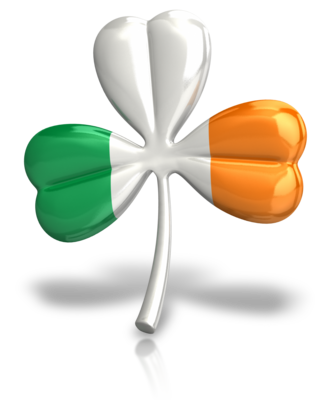
“The Irish Reproductive Loan Fund was a privately funded micro credit scheme set up in 1824 to provide small loans to the ‘industrious poor’ – those most affected by poverty and famine,” says a press release from Findmypast.
“This collection of almost 700,000 records, which span the period of the Irish Potato Famine, provides unique insight into the lives of those living in Ireland during one of the darkest periods in its history. The handwritten ledgers and account books reveal the changing fortunes of Irish ancestors and their subsequent movements in Ireland and across the world. Now anyone can go online and research individuals and families to find out more about where they lived, their financial situation, their social status and more besides.”
Brian Donovan, Head of Irish Data and Business Development for Findmypast, said, “These incredibly important records provide an exceptional insight into the lives of the poor across the west of Ireland from Sligo down to Cork. The people recorded are precisely those who were most likely to suffer the worst of the Famine or be forced to emigrate. These remarkable records allow us to chart what happened to 690,000 people like this from the 1820s to the 1850s, giving a glimpse of their often heart breaking accounts of survival and destitution, misery and starvation. We are very lucky to be able to tell their stories.”
These new records complement an expansive collection of Irish records at Findmypast, including Irish Petty Sessions, Irish Prison Registers, Irish newspapers, Irish Births 1864-1958 and over 800,000 Irish marriages dating back to 1619.. Another new online Irish record collection is the Clare Electoral Registers, which include early female voters.
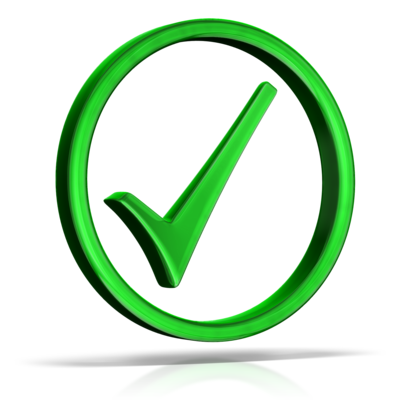 Here’s a tip for Irish genealogy researchers from Findmypast: “The Ireland Census 1911 is an excellent starting point for anyone researching their Irish ancestors. Findmypast’s powerful search will for the first time allow family historians to search for more than one family member at the same time, helping to narrow down results, and by birth year and by spelling variations of a name – all making it easier than ever to trace Irish ancestors.”
Here’s a tip for Irish genealogy researchers from Findmypast: “The Ireland Census 1911 is an excellent starting point for anyone researching their Irish ancestors. Findmypast’s powerful search will for the first time allow family historians to search for more than one family member at the same time, helping to narrow down results, and by birth year and by spelling variations of a name – all making it easier than ever to trace Irish ancestors.”

 Findmypast.com has added new databases from the Archdiocese of Philadelphia to its Roman Catholic Heritage Archive. These include:
Findmypast.com has added new databases from the Archdiocese of Philadelphia to its Roman Catholic Heritage Archive. These include: Learn all about how to start cemetery research with the brand new book, The Family Tree Cemetery Field Guide. Discover tools for locating tombstones, tips for traipsing through cemeteries, an at-a-glance guide to frequently used gravestone icons, and practical strategies for on-the-ground research.
Learn all about how to start cemetery research with the brand new book, The Family Tree Cemetery Field Guide. Discover tools for locating tombstones, tips for traipsing through cemeteries, an at-a-glance guide to frequently used gravestone icons, and practical strategies for on-the-ground research.










 Here’s a tip for Irish genealogy researchers from Findmypast: “The Ireland Census 1911 is an excellent starting point for anyone researching their Irish ancestors. Findmypast’s powerful search will for the first time allow family historians to search for more than one family member at the same time, helping to narrow down results, and by birth year and by spelling variations of a name – all making it easier than ever to trace Irish ancestors.”
Here’s a tip for Irish genealogy researchers from Findmypast: “The Ireland Census 1911 is an excellent starting point for anyone researching their Irish ancestors. Findmypast’s powerful search will for the first time allow family historians to search for more than one family member at the same time, helping to narrow down results, and by birth year and by spelling variations of a name – all making it easier than ever to trace Irish ancestors.”